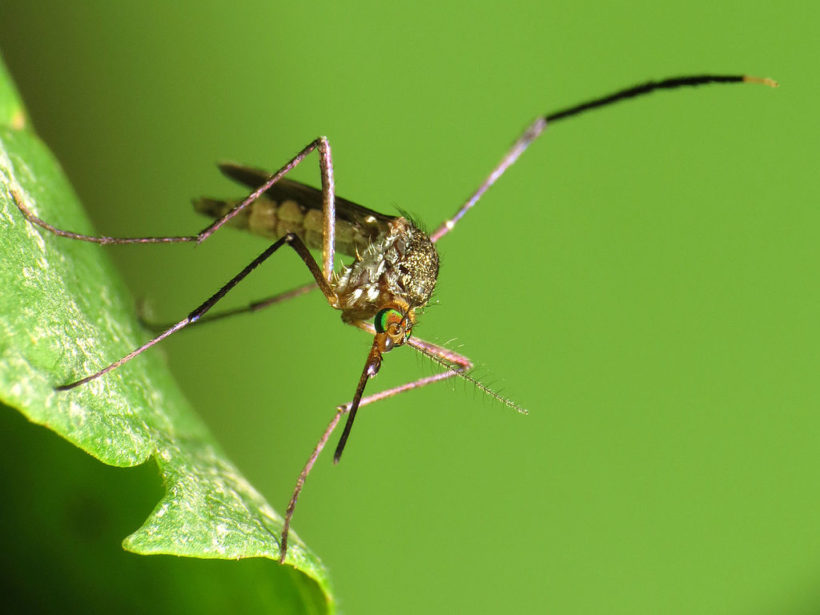 By KATIE O’CONNOR
By KATIE O’CONNOR
All over the state, Virginia residents have been quick to condemn this year’s especially wet summer. But those torrential downpours might be why you have fewer mosquito bites on your arm.
As the climate grows steadily warmer, the risk of increased illness from heat-loving insects like mosquitoes grows with it. The research group Climate Central released a report earlier this month detailing how so-called mosquito disease danger days are rising. There are more days in spring, summer and fall with an average temperature between 61 and 93 degrees, the prime temperature for mosquitoes to spread diseases like West Nile virus.
But heat isn’t the only thing that influences mosquito activity, says David Gaines, the state public health entomologist with the Virginia Department of Health. “There’s certainly a lot more biological, environmental factors that control mosquitoes than just temperature,” he said.
Heat alone does increase the threat of West Nile because the warmer the temperatures, the more quickly a mosquito will be able to transmit the virus. If a mosquito bites a bird with West Nile and sits in a room at 75 degrees, Gaines said, it might take a month for the virus to develop inside the insect and become transmittable to humans, by which time the mosquito might complete its life cycle and die. But if it is sitting in a room at 85 degrees, the disease can develop and become transmittable to humans within three days. “If you have a very warm early season, that gives a big boost to West Nile virus,” Gaines said.
Other factors, though, can influence how active mosquitoes actually are. Take the rainfall that seems to have hit every square inch of Virginia this summer. West Nile virus is primarily carried by Culex mosquitoes, and their favorite habitats are underground storm sewer systems, Gaines said. Large amounts of rainfall will wash out those pipes, though, carrying away eggs and making them uninhabitable.
“I’ve been told by some jurisdictions that they can’t collect enough mosquitoes to test,” Gaines said. So far the state has had three cases of West Nile virus — two in Northern Virginia and one in Hampton Roads. The department is investigating some other cases too, he said, but it’s still too early to say whether it’s West Nile.
Three cases in August is a bit lower than usual, Gaines said. Typically by this time of year, the state will see about four or five cases. According to preliminary data from the Centers for Disease Control and Prevention, last year there were 13 confirmed and probable cases in Virginia. In 2016, there were only eight cases. This year, the cases of West Nile were found a bit earlier than usual, too, pointing to another quirk in mosquito activity. If spring is warm, their eggs will hatch faster and they’ll usually be able to find food faster, too. “If we have a very warm May or early June period, that can spell bad West Nile virus,” Gaines said. “But, it’s not a guarantee, because the mosquitoes that transmit West Nile virus can be hindered by excessive rainfall.”
Earlier this summer, there were higher rates of West Nile-infected mosquitoes than usual, but since then it’s tapered off, possibly because of the rain, Gaines said. The number of mosquitoes in the state don’t necessarily rise with warming summers either, he said. Mosquito surveillance programs around the state typically report that the numbers go up and down from year to year. Some years are more favorable, depending on factors like rainfall. But it all depends on the type of mosquito. “There are about 60 species of mosquito in Virginia, and each one is as different from another as a hawk is from a hummingbird,” Gaines said.
Flood water mosquitoes might thrive after heavy rain, for example. But most lay their eggs on dry ground in depressions, like puddles, which get washed away in the rain. The longer a puddle is around, the more likely it is to attract predatory insects like dragonflies and the less attractive they become to mosquitoes.
But there’s no doubt that more people are getting sick from mosquito, ticks and fleas. The CDC reported earlier this year that diseases transmitted by those insects tripled between 2004 and 2016, and that mosquitoes and ticks introduced nine new germs into the U.S. in that time period.
Ticks are increasingly latching onto deer, Gaines said, and spreading into suburban areas, where they’re more likely to bite humans and potentially spread Lyme disease. According to the CDC, Virginia had 1,350 confirmed and probable Lyme disease cases in 2016, up from just 756 in 2011. And meanwhile, a new tick species has arrived in Virginia, and its ability to spread disease in the U.S. is still unknown. The CDC data is patchier with West Nile virus, showing some years with more than 20 cases followed by a year with fewer than 10 cases. Though a variety of factors influence mosquito numbers and activity, warmer weather will make it easier for them to transmit disease, no matter how many there are.
Editor’s note: This article originally appeared on Virginia Mercury at https://www.virginiamercury.com/2018/08/24/could-climate-change-make-mosquitoes-worse-in-virginia-the-answer-is-more-complicated-than-you-might-think/
Katie O’Connor, a Manassas native, has covered health care, commercial real estate, law, agriculture and tourism for the Richmond Times-Dispatch, Richmond BizSense and the Northern Virginia Daily. Last year, she was named an Association of Health Care Journalists Regional Health Journalism Fellow, a program to aid journalists in making national health stories local and using data in their reporting. She is a graduate of the College of William and Mary, where she was executive editor of The Flat Hat, the college paper, and editor-in-chief of The Gallery, the college’s literary magazine.



Leave a Reply